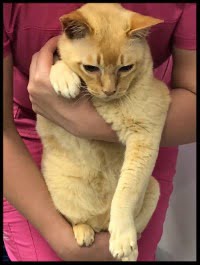Keeping you informed
Newsletter November 2018

Fred couldn’t stop smiling when he heard the news… Hills Dog and Cat Food is now at Turramurra Vet
Turramurra Veterinary Hospital now proudly stocks Hill’s dog and cat food. We believe optimal nutrition is one of the most important aspects of providing care for pets of all shapes and sizes. Hill’s has been producing and researching pet food for over 80 years, is consistently involved with multiple animal charities around the world and has an extensive range of prescription and maintenance foods to suit every pet’s needs. We have been impressed with the immense amount of scientific research that has gone into every food within their range and are confident that your pet will love the taste, and benefit from the premium quality ingredients in every bag. We really want to make sure that your pet is fed the best food possible, so if you have any questions about which food within the Hill’s brand is the most appropriate then please ask our friendly staff for advice. If your pet currently enjoys eating another type of food such as Royal Canin that we have previously stocked, we can easily recommend an equivalent within the Hill’s range for your pet to try, or simply order in your preferred food. We look forward to helping you choose the best food for your very loved furry family member!
Pet of the Month – Casper

Meet Casper! Casper is a gorgeous 12 year old Burmese who recently visited us for the day to have his teeth professionally cleaned. He is doing very well after his cleaning and is happy to have a clean mouth. Our animal companions can’t tell us through words when they are in discomfort or pain. And, did you know, many domestic animals, particularly cats still have a natural instinct to hide their pain so they don’t appear vulnerable? Stopping eating is often the last symptom that happens when the dental disease is advanced. For this reason, regular dental checks are important which we offer for FREE with one of our senior veterinary nurses (provided it is just a teeth check and no other medical issues are examined or discussed which would require a vet consult). How often is regular? Every 6 months… our companion animals age faster than we do and while tooth brushing is gold standard for pet dental care, if your pet doesn’t tolerate it, dental disease will develop faster. Some animals need a professional clean every 12 months just like we do at the dentist.
Paralysis Ticks…Get them before they get you!

We are now in the peak of paralysis tick season. While we see pets affected with paralysis from ticks 12 months of the year, September to December is the worst of it. Ticks love the warmer, but humid weather that Spring and early summer provides. To reduce the chances of your pet needing treatment for tick paralysis:
- Check through your pet’s coat every single day down to the skin (especially around the ears, nose, lips, under the collar and between the toes).
- Clip your pet’s coat short.
- Avoid bush trails when walking your dog in Spring.
- Use a tick preventative registered for Paralysis Ticks such as Bravecto (for dogs and cats) or Simparica (for dogs). If you are finding ticks on your outdoor rabbit or guinea pig, please consult us as an accurate weight and review of the patient needs to occur prior to the dispensing of any tick preventatives.
Click here for more information on tick prevention and paralysis treatment. (Note: link updated with newer advice in December, 2021)
Keep Your Rabbit Cool This Summer

Did you know that your pet bunny can only release heat from the skin on their ears? They can’t sweat, they are covered in thick fur everywhere else and they only pant when suffering from severe heat stroke. Prevention:
- A shady spot (either natural with trees/plants or artificially created with shadecloth).
- Constant access to water (in non spill bowls or bottles that can’t get blocked).
- Digging pit with sand that is out of direct sun (rabbits will dig to cooler sand to stay cool).
- Monitor the temperature (with an indoor/outdoor monitor)
Over 26 degrees:
- Damp towels to lie on.
- Frozen water bottles to lie next to.
- Freshly washed greens to increase fluid intake.
Over 30 degrees:
- Bring your bunny indoors in a cool room either with air conditioning or the above.
If your rabbit is already showing signs of heat stroke such as lethargy, uncoordinated movements, reddened ears, salivation, panting, dehydration (skin staying in position when pinched and concentrated urine) and/or seizuring, please get your rabbit to us ASAP. We close 8pm weeknights, 2pm on Saturdays and 12pm Sundays. During after hours, NEVS (Northside Emergency Vet Service) is available. They are located on 335 Mona Vale Road, Terrey Hills.
Did you know?
Your pet’s photo can now be uploaded onto their microchip file. This can speed up the process of reuniting you and your pet. To do this:
- Go to www.petregistry.nsw.gov.au
- Register a new account or login.
- Claim your pet if this is a new account and then update your details/upload photo.

